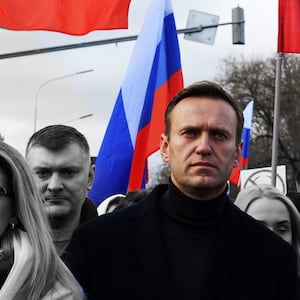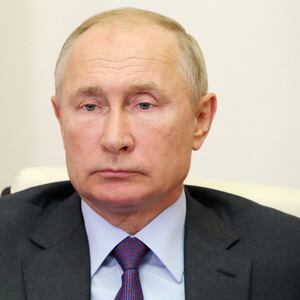MOSCOW—President Vladimir Putin vowed on Thursday he would not be swayed by Western pressure over the poisoning of his most prominent domestic critic, Alexei Navalny.
Nonetheless, a reported mysterious shakeup in a Russian intelligence agency, and other comments by Putin, suggest the Kremlin has been forced to at least try to demonstrate distance between the president and those who might be behind Navalny’s poisoning with the military nerve agent Novichok.
Speaking in front of Russian businessmen, Putin declared he had personally allowed Navalny to leave Siberia for Berlin for medical treatment, which saved the opposition leader’s life. A few hours later, Putin fired the deputy director of Federal Security Service (FSB), General Sergei Smirnov, according to a report in a respected business newspaper, RBK. General Smirnov oversaw an FSB department that has been linked in British media reports to the poisoning.
Navalny, a 44-year-old anti-corruption activist and opposition leader, collapsed on a plane from Siberia to Moscow on Aug. 20. He was in coma while his wife, Yulia, and members of his anti-corruption organization struggled to even visit his sickbed at the hospital, as he was surrounded by FSB and police officers. According to a report in The Guardian, one of the departments managed by General Smirnov, the so-called FSB’s Second Service, was behind Navalny’s poisoning with Novichok.
The shakeup in the FSB became a big day for Kremlin-watchers, who in the best of times struggle to figure out the centers of power behind the Kremlin and FSB doors. To be sure, the firing of the general could have other explanations than the poisoning.
Still, Russia’s media wondered about a link between Smirnov and Navalny. Pavel Lobkov, a news presenter, was on live Rain TV on Thursday for the president’s speech. “First we heard Putin babbling away his usual drill about the evil West and how we relaxed. But then after 6 p.m. he began to talk about Navalny and then we saw the biggest news of the day: Putin removed General Smirnov,” Lobkov told The Daily Beast. “The official reason was age—Smirnov turned 70—but considering what his Second Service was famous for, it could be the punishment for not doing a clean poisoning job. Since FSB is a completely closed and secret service, we did not manage to find anybody competent to comment on Smirnov’s case.”
Smirnov had worked in the KGB and FSB since 1974, first in Putin’s hometown of Leningrad —now St Petersburg—where Putin has also served in the Soviet KGB, then at the central FSB apparatus in Moscow.
News agencies published bits of Putin’s address to the Russian elite and his comments about Navalny. He was reading a text from a piece of paper, quite unusual for Putin, who typically speaks for hours without looking at his notes. His announcement of his personal role in evacuating Navalny was mixed with defiance. “Looking at what is happening in the world, in other countries, I want to tell those who are still waiting for Russia to gradually fade away: We are worried about only one thing—how not to catch a cold at your funerals.”
Navalny, who is still undergoing medical treatment in Germany after being in a coma for nearly three weeks, said Putin was personally behind his poisoning. In his first interview, with Der Spiegel magazine, Navalny said only the most influential people in the secret services, the FSB director Alexander Bortnikov and the head of foreign intelligence office, Sergei Naryshkin, could order the Novichok attack without an approval by Russia’s commander-in-chief. Navalny also blamed Putin for ordering the attack in his interview with Russia’s most popular blogger, Yuriy Dud, viewed by more than 21 million people.
“Putin is afraid of Navalny, the only real opposition leader, who will definitely come back to Russia, fight to get registered for the presidential elections in three years and win the election to be Russia’s next president,” a close Navalny ally, Lyubov Sobol, told The Daily Beast in a recent interview.
An investigative reporter at The Bell, Anastasia Stognei, said that General Smirnov was in charge of several key FSB departments, including department K, which is dealing with economic crimes. The department was famous for several high-profile arrests with links to domestic politics, including the cases of ex-minister of economic development, Aleksey Ulyukayev, and the owner of Summa group, Ziyavudin Magomedov.
Last April, the FSB arrested three of its own officials in Smirnov’s K Department, on suspicion they took multi-million dollar bribes from Russian bankers. “Smirnov was directly involved with the banking sector. Our sources explained the high-profile arrests with ‘insider fighting’ inside the FSB between Smirnov’s clan and Sergei Korolev, the head of economic security service, who they say is going to replace Smirnov as the deputy head of FSB,” Stognei said.
Intrigues in Russia’s secret services have far-reaching consequences, said Sergei Parkhomenko, a commentator on Russia’s politics. Parkhomenko said that Smirnov was a lost chess piece in the fight of Russian secret services. “There are several ‘cleaners’ around Putin, who do dirty jobs in the most dirty ways; Putin might make comments about some personalities, his services fulfil what they believe were the boss’ wishes, then we hear of Anna Politkovskaya’s or Boris Nemtsov’s assassinations, poisoning of Alexander Litvinenko or a less successful poisoning attempt of Sergei Skripal or Navalny,” Parkhomenko told The Daily Beast on Thursday. “But we don’t have any clue. Maybe there were more than 100 successful poisoning attempts, when young and healthy people died a quiet death.”







